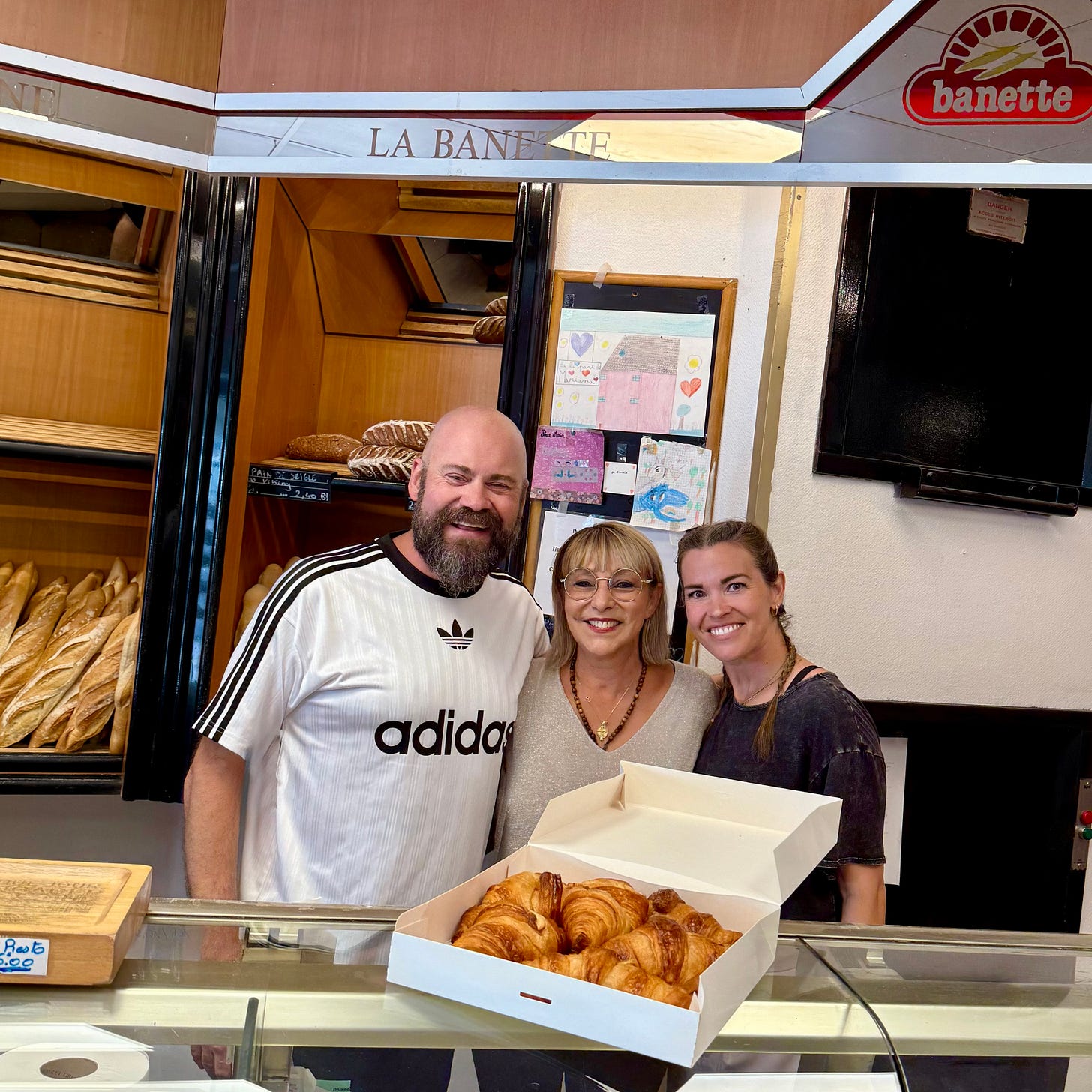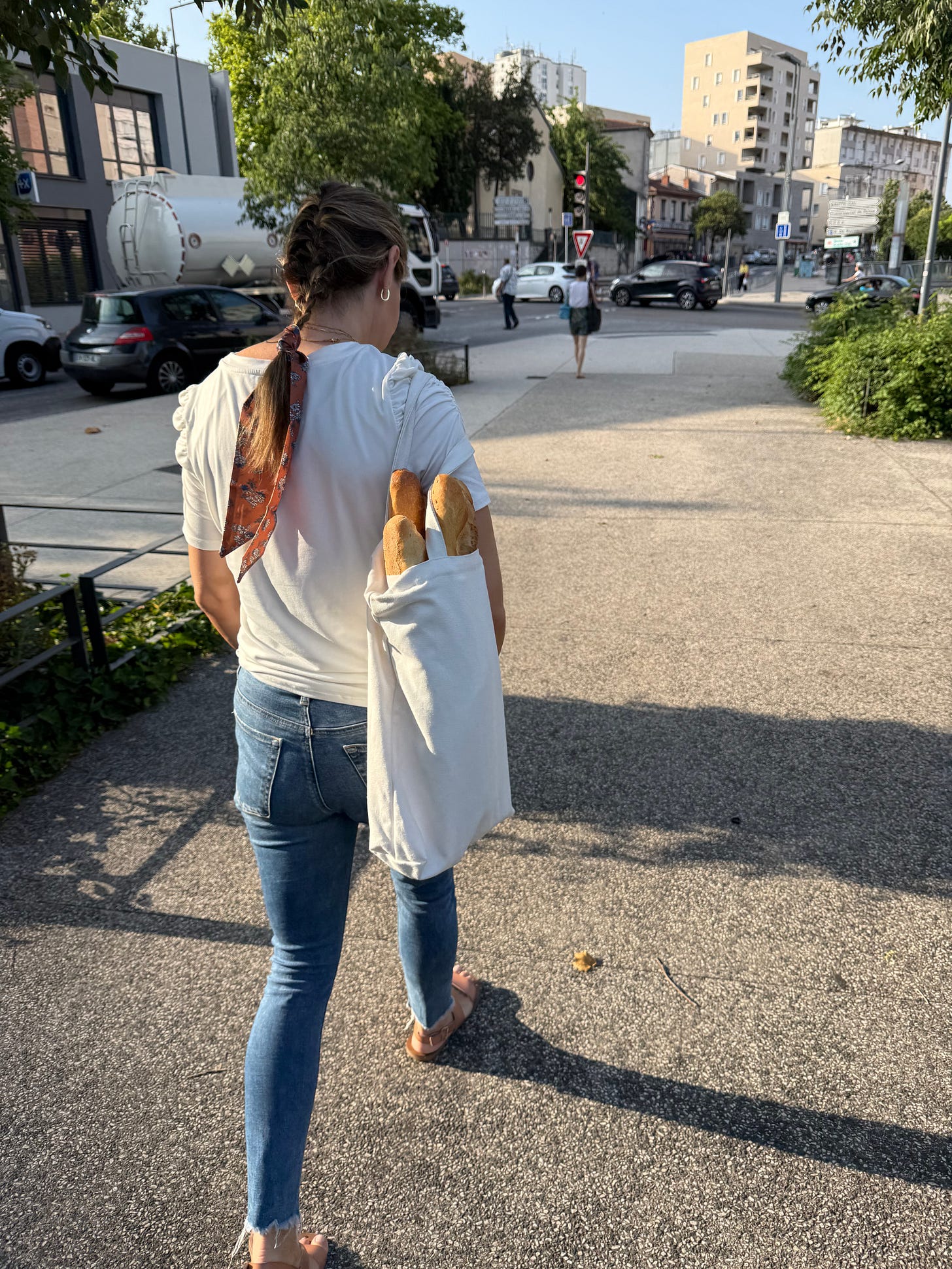Lost Bread
How Deeply Can One Philosophize Over A French Baguette?
It is absolutely true; French culture does revolve heavily around food, and particularly bread. Daily routines are planned and organized in such a way to ensure that each meal is savored, valued, and as social as possible. And it all starts with breakfast.
Breakfast typically involves walking to a favorite boulangerie or cafe and enjoying a fresh croissant, pan au chocolat, or baguette with a small drink. Boulangeries usually open around 7am (always depends on when the owner feels ready to open) and residents form rapid queues as fresh breads begin to pour out of the kitchen. Food is never eaten “on the go” or while walking. Rather, patrons either find a small table to sit and socialize while they enjoy the hot pastries or take them home to share with family members. It’s a sacred ritual that I have been more than happy to acclimatize into.
Now, let me introduce you to Maria.
Maria runs the boulangerie down the street from our apartment here in Lyon. She doesn’t speak a word of English, but we discovered that she is fluent in Spanish which has made it much easier for me to communicate with her as my French is still pretty rusty. Every morning she happily welcomes each and every visitor to her store with a smiling “bonjour!” (or in our case now, “buenos días!”) She takes her time to chat with each person as she fills their bags with fresh bread. Not a single person waiting in line is bothered by the slow pace or socialization as they patiently wait for their turn to order.
We now find ourselves at Maria’s shop most mornings as well. She happily chats with us in both French and Spanish and we find she likes to sneak a bonus croissant or two into our bag when she knows we may have guests visiting or the kids are in tow. She is a joyful and very welcome part of our mornings.
You may have also noticed that big pile of baguettes behind us in the picture. Let’s take a minute to talk about baguette. Remember that scene in Star Wars: The Force Awakens when Rey asks Han Solo, “The Jedi were real?” Han looks at her and replies, “I used to wonder about that myself. Thought it was all a bunch of mumbo-jumbo…Crazy thing is, it’s true…All of it. It’s all true.”
The same can be said for French baguette.
I know I first came into France with a preconceived stereotype that French people walked around all day with a baguette under their arm or in their bicycle basket while they rode through the park in a sundress. Here’s the thing; it’s true. All of it. It’s all true.
Baguettes are a magical item. They are eaten hot and fresh out of the oven for breakfast. Grab a few extra loaves, some ham, sliced cheese, and salty butter and you have a simple yet extremely satisfying lunch option. Need an afternoon snack? Simple. Cut open the little bit of baguette that remains after lunch, a little spread of that same salty butter and a square of dark chocolate and you just made a goûter. A delicious mix of sweet and salty that takes the edge off before dinner kicks off at 9pm. Baguettes are used for seemingly everything and they must be purchased fresh because they do go stale very quickly. That is why people are seen constantly walking around with a few loaves under their arm. You literally have to buy them every day and sometimes even multiple times a day. You may think that sounds like an absolutely annoyance, but the people here truly do not see it as an inconvenience. It is always an opportunity to get some amazing bread while at the same time having a brief moment to get out in the sunshine and to socialize.
But one of my favorite discoveries is what happens with the stale or discarded baguette. At my office we have a bin to collect all of the uneaten baguette (because yes, it is served with every meal). If you didn’t end up finishing your little piece of bread, you need to toss it into the bread collection bin instead of the trash. These discards are then sent to local farms to grind into animal feed for the local farms.
Baguette that goes stale at home isn’t thrown into the trash either. Instead, you dunk it into a mixture of egg, milk, and cinnamon and grill it up in a frying pan. That’s right! French toast! I think I always kind of knew that, but I’m in love with a little bit of new knowledge the French have taught me. First of all, nobody here calls it French toast. That is 100% an American thing. Kind of like how we call the stuff on pizza Canadian bacon. Go ask any Canadian what Canadian bacon is and they will look at you like you are crazy. They just call it what it is; ham! Why do we call it Canadian bacon? Who knows. French toast? French fries? I have no clue. I guess at least French toast comes from France, so there is that. (Remember too that for a hot minute there was that whole ‘Freedom fries’ movement? Yeah, I don’t know. I’m still confused.)
Anyways, the French do not nor have they ever called this bread, egg, and milk concoction ‘French toast’. They call it pain perdu (pronounced pawn perdue). This literally translates to ‘lost bread’. How great is that?! We invited a few of the French interns from my company out to dinner with our family one night and they happily explained pain perdu to us saying, “we give the baguette new life. Plus, it’s delicious.”
I was honestly struck with the simple beauty of this concept and description. Lost bread. What a fabulous way to describe the dish. I immediately thought about Maria and the love she puts into every single loaf of baguette and the attention she gives to every single patron of her shop. I thought about the role this simple loaf of bread in literally every single meal throughout the day and the energy people expend to carry loaves with them to their homes. I thought about the care all of my co-workers take to separate the bread discards from their trays so that it continues to provide life to others. The loaves carry such value despite their very low cost. Why would you ever let something like that be wasted or simply thrown away?
I don’t exactly know why, but these thoughts ruminated with me for a day or two and I couldn’t help but make a connection to a few scriptures that bounced around in my brain.
Give us this day our daily bread.
Matthew 6:11
Blessed is he that shall eat bread in the kingdom of God.
Luke 14:15
Bread is a very common theme throughout Christian doctrine. Christ’s ultimate sacrifice for us is even symbolized with bread. I think at the end of the day I was simply struck with the realization that to the people here, there is a very literal bread that is vital to their day to day interactions. It feeds and sustains but it also acts as a catalyst to engage with and communicate with others. Alton Brown once said that if you want to break down barriers with those you disagree with, sit down and break bread with them first. This literal bread is also so important to the culture that it is given a second life which is memorialized in its name. Lost bread.
When I reflect on the words of Christ speaking about eating bread in heaven or being blessed with daily bread, of course He’s not speaking about literal bread. But I also don’t think He is talking about necessarily our own individual spiritual feeding. Those scriptures now make me think how blessed I am to interact with people like Maria on a daily basis. I think about how grateful my family is as we gather around a meal that each family member literally carried a portion of for blocks before we got to enjoy it. I think of how grateful I am that every single one of us has the daily ability to be our own lost bread. How often we mess up or do stupid things, but there is always hope that with a simple mixture of egg, milk, and cinnamon, we can always hope for a better tomorrow. Heaven is not us simply being sustained in a vacuum. It is us interacting with, sustaining, and sharing with others.
So, do we carry a baguette with us everywhere we go?
Yes. It’s true.
All of it.



